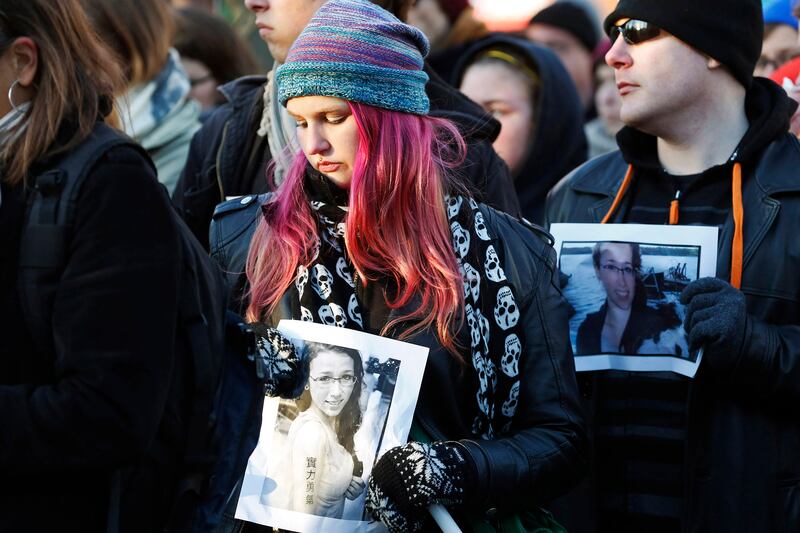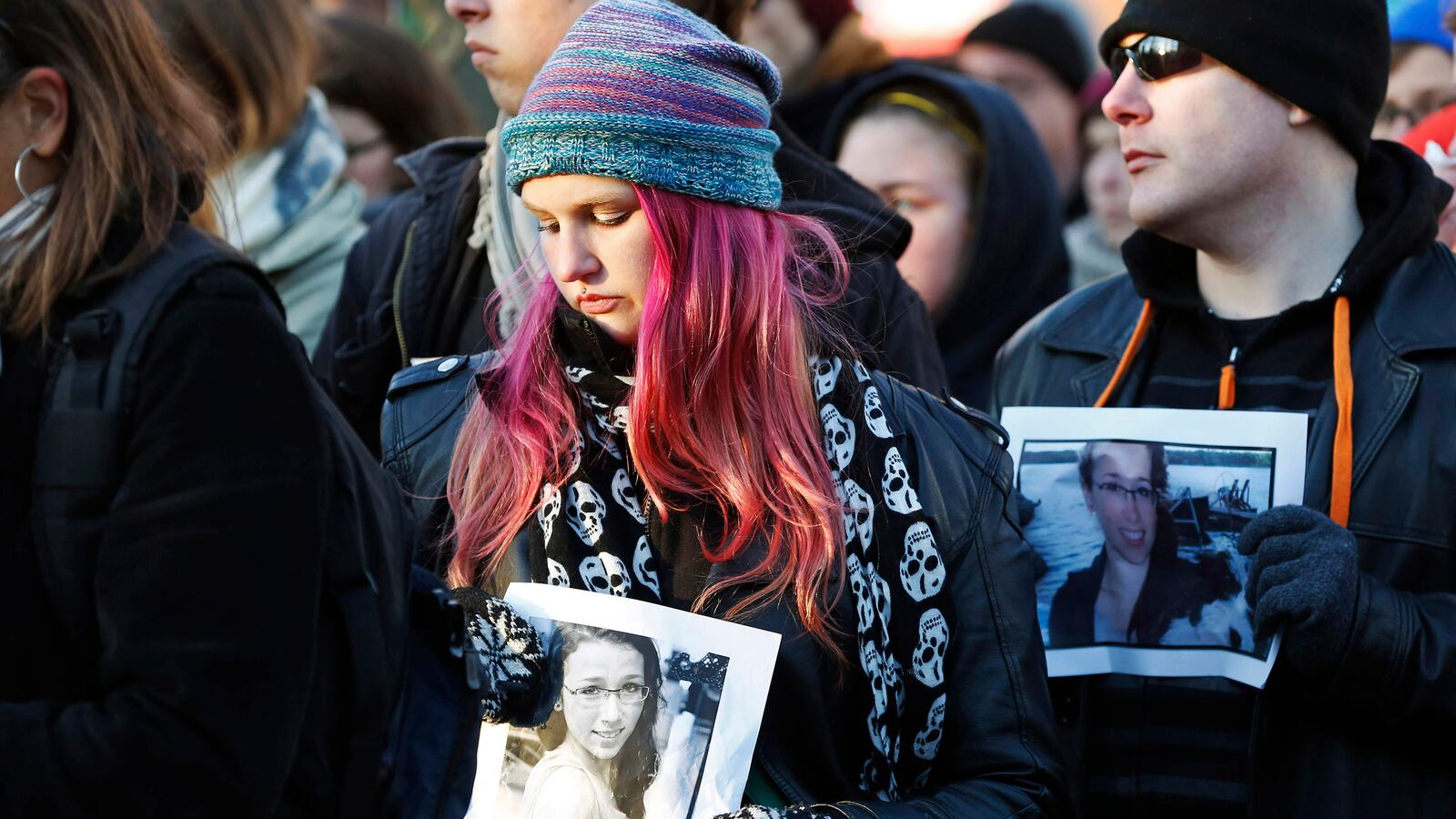It was close to midnight on April 4 when Jenna Campbell went downstairs to her friend’s kitchen to get her a piece of pizza and a cup of coffee. Her friend, 17-year-old Rehtaeh Parsons, was arguing on the phone with her boyfriend and Campbell wanted to give her space. “It was one of those stupid little fights,” Campbell recalls.

Campbell was used to her best friend’s sudden mood swings. Two years earlier, when Rehtaeh was just 15 years old, she told her mother that four teenage boys had raped her while she was drunk on vodka and passed her around at a small house party in November 2011. A photograph of the alleged assault was taken, and within a few days it had spread like wildfire through social media. Rehtaeh was subsequently called a “stupid slut” and ruthlessly bullied by classmates and peers in the Halifax, Nova Scotia, suburb of Cole Harbour, a small community mostly known for its hockey-star hero Sidney Crosby.
“It went to every kid’s cellphone,” Campbell, 16, told The Daily Beast. “Everyone assumed she was being a slut. That she wanted it. She was telling people ‘I got raped,’ and they said she was a slut and decided not to believe her.”
Rehtaeh’s family went to the police, but after nearly a year of investigating, the Royal Canadian Mounted Police and Halifax police concluded that there was insufficient evidence to file charges of rape or for distributing the photo that allegedly depicted one of the teens having sex with Rehtaeh, and giving a thumbs up while the young girl was throwing up out a window.
“She was angry all the time over it,” says Campbell. “It was something stuck in her that she couldn’t let go. She was angry that nothing happened to the boys. She would say, ‘No wonder I am so depressed and pissed all the time.”
Rehtaeh dropped out of her school and bounced around others after the alleged attack, Campbell said, even ending up in a children’s hospital for six weeks. But she was slowly getting back on track. The bullying had ebbed. She got a new boyfriend. She quit smoking weed, and she was looking for full-time work. “People weren’t bullying her anymore about the rape,” Campbell said. “Everybody started letting it go.”
But, on that fateful April night, Campbell said Rehtaeh “was just too mad.” Campbell returned upstairs from the kitchen and found her friend extremely upset.
“She looked at me and grabbed a belt and said, ‘I am going to kill myself,” Campbell recalled. In an instant, Rehtaeh had run inside the bathroom and locked the door. “I didn’t think she would do it. I was talking through the door with her a bit. She said, ‘Go away. Nothing you say will change anything.’ I told her I love her, her boyfriend loves her, and her family loves her.”
Campbell says she ran to get Rehtaeh’s mother, Leah, and they were able to pry open the bathroom door. “I called 911,” says Campbell. “ I was shocked. She did threaten to kill herself before but she never went through with it. Even when I lived with her she would say, ‘I want to kill myself,’ and I said, ‘Don’t. I love you and it would break my heart.”
Rehtaeh, whose first name is Heather spelled backward, was rushed to the hospital. She was taken off life support four days after she hanged herself. “It is a nightmare I can’t wake up from,” Campbell said.
A mass public outcry followed the tragic suicide. The local and international community widely criticized the police department for dropping the ball on her case. Locals staged protests outside the police station, and at least one fight broke out at Rehtaeh’s former high school.
“If someone says they have been sexually assaulted and there is a picture to prove it and the police shrug it off, I don’t believe in the police anymore,” said former Cole Harbour High student Victoria Boutilier, who met Rehtaeh in fifth grade. “The way they described the picture I highly doubt it was casual. I don’t think she was capable of making a decision.”
On April 12, amidst an extreme public backlash, the RCMP announced that they were reopening the investigation into her rape allegations after credible “new evidence” surfaced. “We will look into it and see how it goes,” said RCMP Corp. Scott MacRae. “Now it is an ongoing investigation.”
The news came after the hacker group Anonymous threatened to out the alleged attackers, said to be in grades 10–12 and still walking the halls of Parsons’s former high school. MacRae said Anonymous played no role in the new information obtained by the police and criticized the group for “acting on a primal urge for revenge.”
“We understand there is outrage why charges weren’t laid and there were reasons for that,” said MacRae. “Police have to look at the totality of everything and one thing doesn’t stand on its own. Does the new evidence change that? It is too early to tell.”
Jon Blanchard, a technology columnist for Canada.com who says he is a member of Anonymous, said the group is now waiting for justice to take its course. “What the operation was trying to do was get the government to act,” he said. “This is the great tragedy when the justice system doesn’t do its job. I can understand why people would be skeptical, but someone in this province came forward and did the right thing.”
But not all the public support has been for Rehtaeh. Recently, a family member of one of the accused teens started a forum on Facebook. At one point the page had more than 100 followers, including a girl who wrote, “I know they did nothing wrong. I believe them boys over anything.” Another supporter penned: “Let’s be honest here there [sic] all good-looking guys … they wouldn’t have to rape someone.”
The page was taken down, according to the Halifax Chronicle Herald, because the police didn’t want the names of the alleged attackers to end up in cyberspace. But locals say their identities are an open secret.
Meanwhile, the streets around Cole Harbour and neighboring Halifax were peppered with pink, purple, and yellow flyers in support of the four teens. The fliers—which read, “Speak the Truth. There’s two sides to every story. Listen before you judge. The truth will come out. Stay strong. Support the boys”—were even plastered on telephone poles on Rehtaeh’s mother’s street.
Leah Parsons took to Facebook to condemn the action. “Really???,” she wrote. “They stop at nothing … This is our street, we are mourning our daughter, my children live in this neighborhood. If you wanted to speak the truth … why didn’t you speak when Rehtaeh was alive … You push her to suicide then you continue with this bullshit!!! Really??? You have no compassion … but we knew that already.”
“This doesn’t compare to anything I have covered here,” says Selena Ross, a reporter with the Herald who has been covering the case and wrote about the Facebook support page and the posters. “I can’t even describe how upset people were. Tensions were really high.”
On April 26, Nova Scotia justice minister Ross Landry said a new law is in the works that would ban malicious transmission of intimate images. The law would target anyone who maliciously distributes pictures of someone’s genitalia, anus, or breasts, and that person would face a maximum prison term of 10 years, the same as a child pornography sentence in Canada.
Jenna Campbell said she missed her friend daily but is happy she was able to say goodbye to the girl who used to flick her on the forehead every morning to wake her up for school and help her pick out an outfit so she “didn’t look dumb walking out the door.”
“Three of us went into the hospital and we told her we had a night for her,” she says. “We told her all about it because our friend screwed up her thumb. Most definitely she heard us.”
Campbell says she herself has been bullied since her friend passed away from a girl who blamed her for not knocking down the door and getting to Rehtaeh fast enough. “That is so rude,” she says. “I was one of the girls who was there for her and made her life a little happier.”





